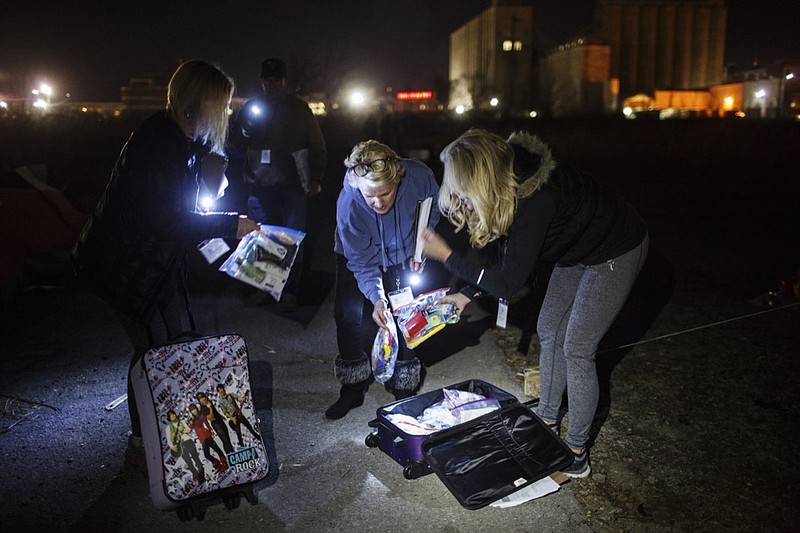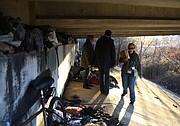Chattanooga's mayor says one key piece of getting homeless people off the streets and into housing is, literally, staying on their case.
That's why Mayor Andy Berke wants to assemble a squad of housing navigators who will help people find places to live as the city's first step in a new, comprehensive plan to combat homelessness.
"The only thing that can end a person's homelessness is to put them in housing," Berke told Chattanooga Times Free Press reporters and editors Monday in a briefing ahead of Tuesday's public unveiling of the 2018 Homelessness Action Plan. "We have to have a system in place that can get people from where they are into housing."
With focused services, 85 percent of homeless people who get into housing will stay there, Berke said.
The Chattanooga Interagency Council on Homelessness will discuss the draft plan at 11 a.m. Tuesday at the Chattanooga Housing Authority, 801 N. Holtzclaw Ave.
Berke created the interagency council in March with partners including the Chattanooga Regional Homeless Coalition, the Chattanooga Housing Authority, several foundations that support homeless programs, and the area's medical and mental health community, among others.
The stereotype of the homeless - mostly male, mostly with mental or substance abuse problems wandering the streets or sleeping in doorways - is only a small part of the larger reality of homelessness in Chattanooga, the draft action plan says.
The annual January point-in-time count of the homeless found 641 adults and 627 children. Of 2,024 people who received services from city homeless programs this year, nearly half had children and 26 were children, unaccompanied by a parent or guardian.
About 80 percent of homelessness is "episodic," said Tyler Yount, the mayor's director of special projects, who presented details of the draft plan to the Times Free Press. People may lose jobs, become ill or face other sudden crises that push them over the financial edge.
"They got behind on their rent, got evicted and became homeless," Yount said.
Whether it's a family having a run of bad luck or someone with a serious substance or mental health problem, getting people into housing and helping them stay there requires outreach and a focused plan of action.
For instance, CHA Executive Director Betsy McCright said she has 575 units available for homeless people, but she doesn't necessarily have the skills or staff to find those people and tell them about it.
"This is an opportunity for my agency to interact with other agencies" in the fight against homelessness, said McCright, who was with Berke at the paper.
Berke said the city learned a great deal when it set and attained a goal to house homeless veterans in 2016, and those lessons helped shape the larger plan.
The draft plan covers four years and has four main steps:
' Identifying people who are homeless, creating standard assessments and referrals, maintaining solid databases of housing units and resources and adding 25 outreach workers, housing navigators and service coordinators at a cost of around $1 million a year. The plan envisions creating a mobile services van in future years to take services to where homeless people are, at a cost of $300,000 to $400,000 for the van and $500,000 to $700,000 in annual operating costs.
' Creating emergency and temporary shelters for immediate needs. Existing shelters often have "barriers to entry," such as requiring sobriety or a religious lesson, the plan states. The city could use hotel vouchers for temporary shelter and, in the future, build a 250-bed emergency shelter at a suggested operating cost of about $5.6 million a year.
' Placement into permanent housing, through the Chattanooga Housing Authority or other programs, with intensive case management and service coordination. The plan calls for a flexible community fund of around $1.5 million, supported by donors and grants, to cover rent, utility payments and deposits at need, and working with landlords to identify more affordable housing. There's also a need for "supportive housing" where the chronically homeless can receive a full spectrum of services to address their needs. That's estimated between $500,000 and $2 million a year, Yount said.
' Dedicating resources to helping people stay in housing using case management and offering services as needed, from medical and mental health treatment to life skills and job fairs. Longer term, the plan envisions a housing trust fund and a PILOT program for building affordable homes.
Yount said the interagency council believes the plan would cost $10 million in the first four years, but much of that money is already in place and being used for homeless services. He said it's not known how much new money might be needed.
Berke added, "Let's build out the system we want and then see how far we can get toward it."
The city is going to "step to the table" right away to hire housing navigators who can help people get housed and stay housed, Berke said. The housing plan is going to be one of his top priorities for the 2019-20 budget, he added.
Two Chattanooga City Council members who have worked to combat homelessness across the city said they're eager to learn more about the interagency council's plan.
"I want to see an implementation strategy that's going to be dealing with those involved who need a variety of services, such as mental health, transportation, housing and employment, linking them to partner agencies with expertise specific areas," Vice Chairman Erskine Oglesby Jr. said.
"Another expectation is that whatever they come up with, there's a strategy that's going to be sustainable. There needs to be one organization that's going to be responsible for seeing this plan through over time."
Councilman Darrin Ledford said making any plan involving multiple agencies work "is going to require a whole lot of conversations [and] a shared vision."
"This topic is very dear to my heart and I want us as a city to address it," Ledford said. "We can do it, we can do it together because we're good people here. It's probably not going go be cheap, but it's a growing problem and that problem needs some serious attention."
The Chattanooga Regional Homeless Coalition, which has coordinated federal funding for various homeless programs for decades, can use the help, Executive Director Wendy Winters said.
"We're grateful for all these people coming to the table and supporting our ongoing efforts and having a shared goal of making sure homelessness is brief, rare and nonrecurring," Winters said.
She called the stereotype of the homeless as vagrants and substance abusers "unfair."
"We just spent $10 million on an animal shelter. These are human beings," Winters said.
"We believe that housing is a human right. People are out there living in conditions that are not meant for human habitation and it's not necessarily their fault they're in that situation."
Contact staff writer Judy Walton at jwalton@timesfreepress.com or 423-757-6416.

